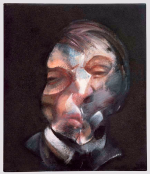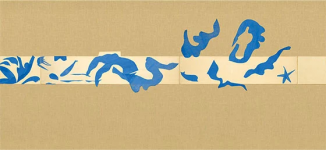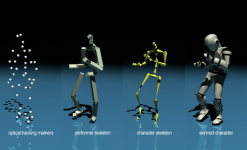There's an idea taking shape in my head that says there is music that traces the entire arc of a movement in real continuous time, and other that works as a series of jump cuts, so that there are sections of the tape missing, you find yourself leaping from point A to B without having been lead there. What is your opinion on that
You are using an out of date browser. It may not display this or other websites correctly.
You should upgrade or use an alternative browser.
You should upgrade or use an alternative browser.
distribution points
- Thread starter ohman
- Start date
And that the length of time between distribution points matters, for the sense of movement, the difference between a timbaland and a juan Atkins for example
Maybe parallels with robotics, and the move to full articulated limbs and range of movement from a geometry of straight lines
At one end of the spectrum the fluid unbroken line of Arabic calligraphy
Maybe parallels with robotics, and the move to full articulated limbs and range of movement from a geometry of straight lines
At one end of the spectrum the fluid unbroken line of Arabic calligraphy
how music maps a movement of the body, distances to be traversed, velocities and directions of travel
this maybe relates to bergson's ideas about zeno's paradox:
https://www.rep.routledge.com/artic...louis-1859-1941/v-1/sections/bergson-and-zeno
vitalist concepts. and probably deleuze and his ideas.
perhaps some musics seek to break that description of flow with ruptures.
maybe relates to the smear and smear as a proposed advance on cubism

this maybe relates to bergson's ideas about zeno's paradox:
https://www.rep.routledge.com/artic...louis-1859-1941/v-1/sections/bergson-and-zeno
vitalist concepts. and probably deleuze and his ideas.
perhaps some musics seek to break that description of flow with ruptures.
maybe relates to the smear and smear as a proposed advance on cubism

Leo
Well-known member
There's an idea taking shape in my head that says there is music that traces the entire arc of a movement in real continuous time, and other that works as a series of jump cuts, so that there are sections of the tape missing, you find yourself leaping from point A to B without having been lead there. What is your opinion on that
This is what a good DJ does.
well its obviously a nutcase theory but i get you
language is also somewhat jump-cut: it can never be as truly fluid as music or dance
but even so there’s a spectrum: not exactly sure where to place them but nietzsche and your autistic mate are at opposite ends i reckon. in a way nietzsche is fluid; at the same time he doesn’t map out the argument but just sort of smash cuts from one thought to another. whereas your autistic mate maps it out in the tiniest detail: so detailed, in fact, that perhaps he approaches another kind of fluidity? four points is a quadrilateral. eight an octagon. keep going and eventually you get a perfect (fluid) circle
but you weren’t on about language were you. sorry
all this makes me think about science stuff i was doing. ways of sampling curves (more points, more accurate / fluid); compression (retaining the minimum info for the maximum effect
music: a sinuous violin solo in which every note is fluid with the next; the hand and arm mapping a continuous complex shape in space? versus like stockhausen who is very crude but by leaving gaps in the musical thought creates a very different feeling of movement?
or to put it in terms youll understand its like enya versus toxic by britney u kno
but srsly i totally get you. musicians talk about this a lot: the feeling of time. i remeber reading some borges ages ago and it was really pacy, leading into a fight in some seedy bar in the arse end of nowhere when suddenly this guy tosses up a knife and borges, does, this, thing, where, he, makes, time, slow, way, down just for a moment before it all kicks off. can’t remember how he does it but there you are
language is also somewhat jump-cut: it can never be as truly fluid as music or dance
but even so there’s a spectrum: not exactly sure where to place them but nietzsche and your autistic mate are at opposite ends i reckon. in a way nietzsche is fluid; at the same time he doesn’t map out the argument but just sort of smash cuts from one thought to another. whereas your autistic mate maps it out in the tiniest detail: so detailed, in fact, that perhaps he approaches another kind of fluidity? four points is a quadrilateral. eight an octagon. keep going and eventually you get a perfect (fluid) circle
but you weren’t on about language were you. sorry
all this makes me think about science stuff i was doing. ways of sampling curves (more points, more accurate / fluid); compression (retaining the minimum info for the maximum effect
music: a sinuous violin solo in which every note is fluid with the next; the hand and arm mapping a continuous complex shape in space? versus like stockhausen who is very crude but by leaving gaps in the musical thought creates a very different feeling of movement?
or to put it in terms youll understand its like enya versus toxic by britney u kno
but srsly i totally get you. musicians talk about this a lot: the feeling of time. i remeber reading some borges ages ago and it was really pacy, leading into a fight in some seedy bar in the arse end of nowhere when suddenly this guy tosses up a knife and borges, does, this, thing, where, he, makes, time, slow, way, down just for a moment before it all kicks off. can’t remember how he does it but there you are
Time as motion picture vs comic book panel or that strobe lighting effect.
the 90s is rhythmically fascinating cos it’s taking that blocky 80s language but giving the dexterity of more fluid forms of music.
There's more distribution points filled in, points on the graph plotted
Not lego blocks, but particles.
the 90s is rhythmically fascinating cos it’s taking that blocky 80s language but giving the dexterity of more fluid forms of music.
There's more distribution points filled in, points on the graph plotted
Not lego blocks, but particles.
Leo
Well-known member
well its obviously a nutcase theory but i get you
language is also somewhat jump-cut: it can never be as truly fluid as music or dance
but even so there’s a spectrum: not exactly sure where to place them but nietzsche and your autistic mate are at opposite ends i reckon. in a way nietzsche is fluid; at the same time he doesn’t map out the argument but just sort of smash cuts from one thought to another. whereas your autistic mate maps it out in the tiniest detail: so detailed, in fact, that perhaps he approaches another kind of fluidity? four points is a quadrilateral. eight an octagon. keep going and eventually you get a perfect (fluid) circle
but you weren’t on about language were you. sorry
all this makes me think about science stuff i was doing. ways of sampling curves (more points, more accurate / fluid); compression (retaining the minimum info for the maximum effect
music: a sinuous violin solo in which every note is fluid with the next; the hand and arm mapping a continuous complex shape in space? versus like stockhausen who is very crude but by leaving gaps in the musical thought creates a very different feeling of movement?
or to put it in terms youll understand its like enya versus toxic by britney u kno
but srsly i totally get you. musicians talk about this a lot: the feeling of time. i remeber reading some borges ages ago and it was really pacy, leading into a fight in some seedy bar in the arse end of nowhere when suddenly this guy tosses up a knife and borges, does, this, thing, where, he, makes, time, slow, way, down just for a moment before it all kicks off. can’t remember how he does it but there you are
are you having a conversation with yourself?
mvuent
Void Dweller
great thread.
the one major exception from the blockiness of the 80s is turntablism, a development which allowed for a superhuman agility that no one quite knew what to do with. it's no coincidence that so many of the best early junglists (hype, gerald, aphrodite, etc.) were former b-boys. that foundation prepared them to lead the charge in the breaks science era.Time as motion picture vs comic book panel or that strobe lighting effect.
the 90s is rhythmically fascinating cos it’s taking that blocky 80s language but giving the dexterity of more fluid forms of music.
There's more distribution points filled in, points on the graph plotted
Not lego blocks, but particles.


